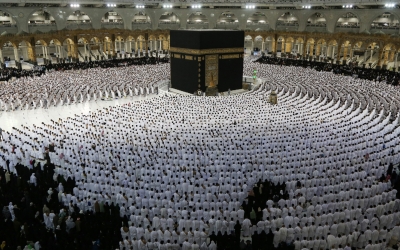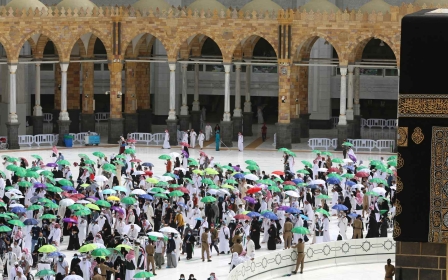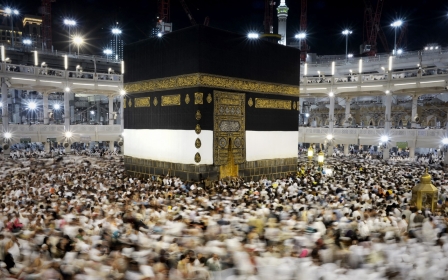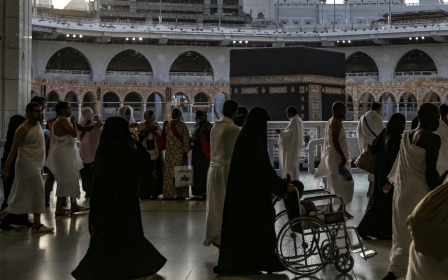Hajj lottery: How a surprise Saudi decision 'devastated' UK Muslims
Until a fortnight ago things were looking promising for British Muslims preparing to visit Saudi Arabia for Hajj. Preparations for the annual pilgrimage - which takes place between 7-12 July this year - were smoothly gathering pace.
But then everything suddenly changed.
'The whole thing is just devastating and heartbreaking. People's livelihoods in a click of a finger have just gone'
- Habibur Rahman, UK-based Hajj tour organiser
Hajj tour operators had been given the green light to sell long-anticipated packages to Muslims across the UK, after a painful two-year hiatus due to the pandemic.
“Just 14 to 15 days ago we had the utmost belief that we would be going,” Habibur Rahman, a London-based Hajj tour organiser, tells Middle East Eye. “That's the feedback we were getting on the ground in Saudi Arabia.”
The Hajj pilgrimage is one of the largest religious gatherings in the world. It is considered a religious obligation that should be completed during the lifetime of every Muslim who is healthy and able to afford it.
Before the pandemic, around 25,000 Muslims from the UK were allocated to go to Hajj each year.
But after Saudi Arabia announced that the pilgrimage was to be scaled down in 2022 - with numbers cut to one million pilgrims worldwide instead of the pre-pandemic total of 2.5 million - Britain’s quota was slashed by around half the expected figure to 12,348.
One of those prospective UK travellers was Bushra, a 31-year-old university lecturer from Bradford. She started researching her journey in December and found a tour company led by British imams who she felt aligned with her ideology and outlook.
“After the Hajj ministry gave the travel agents the go-ahead and the licence, I paid £10,000 to confirm my place,” Bushra told MEE.
Rahman’s tour group, Al-Kabir, normally takes 120 hujjaj (Hajj pilgrims). This year it was allocated 58 - all of whom had paid, requested leave from work, and attended preparatory seminars.
But then came another surprising and sudden statement last week. Saudi Arabia announced that pilgrims from Europe, Australia, and the Americas could not book through tour groups for this year’s pilgrimage.
Instead, they would have to apply through a random lottery on the Saudi government-backed Motawif website.
“It was a complete bang. Just like that, it all changed,” Rahman said.
Anger at Saudi authorities
Those who had booked packages through Hajj tour groups were told by Saudi authorities to immediately request refunds, and to enter the lottery.
“My overwhelming emotion was anger at the Saudi government for changing things so last minute,” says Bushra.
“They feel they have every right to play about with the system. It takes ownership away from the hujjaj and into control of someone you'll never see or know.”
'My overwhelming emotion was anger at the Saudi government for changing things so last minute,'
- Bushra, British Hajj applicant
Hajj tour companies, many of which have been around for decades, tailor their packages around the needs of customers.
For example, Al-Kabir mostly takes British Bangladeshi pilgrims. Its packages are hosted by Bengali-speaking staff and imams and provide Bangladeshi food.
While Motawif has given some information about the cost and itineraries of its packages, many of the details - such as the number of people in each of its groupings, and how the groups would be decided - remain unexplained.
Bushra said she did not apply through the lottery because it failed to include the type of tailor-made service she was after.
“When I made the decision to go with a group, it was because I trusted the people going,” the Bradford-based lecturer says.
“I trusted the ideology and thought process of those who would be teaching and guiding me. I was comfortable that I would be guided by a British sheikh who knows my context and needs. Under this new system, you have no idea what you’d end up with.”
She said she had not yet requested a refund for her £10,000 down payment in case the portal system failed to attract enough numbers and tour operators were reactivated.
For organisers like Rahman, the last-minute changes have been a financial and logistical hammer blow.
“We’re the type of company that, if we owe anyone any money, of course, it will be back with them as soon as possible,” he says.
But Rahman says recouping money from Saudi suppliers has been an ongoing struggle and he is still waiting to receive refunds from Saudi hoteliers after Hajj was cancelled in 2020.
“The whole thing is just devastating and heartbreaking. People's livelihoods in a click of a finger have just gone. We’re not just talking about UK employees - we have a lot of Saudi-based employees for jobs that may no longer exist.”
Saudi ‘cuts out middleman’
It is not entirely clear why Saudi authorities made the decision to change the system, particularly given that Hajj is less than a month away.
It is possible that the country could be piloting a direct-to-consumer Hajj experience in the hope of ‘cutting out the middleman’ in future years.
“This experiment in business-to-consumer marketing and selling hasn’t put its pilgrim-consumers at the centre of thinking despite the rhetoric. Credibility and trust cannot be taken for granted,” Sean McLoughlin, a professor of the anthropology of Islam at Leeds University, tells MEE.
McLoughlin is the author of Mapping the UK's Hajj Industry and produced the first report on Britain's Muslim pilgrimage industry.
“IT systems and on-the-ground service providers will need to comprehend Muslim pilgrim-consumers in all of their local and global diversity. The problems witnessed thus far suggest that there is a need for a shift in this regard,” he added.
Some British Muslims are hopeful that the new lottery system could pave the way for a cheaper Hajj.
“The prices on the portal look great. We’re talking three thousand pounds cheaper than what the tour operators were charging,” Faiyaz, a business analyst from Cheshire, tells MEE.
The 25-year-old, who is waiting to learn the outcome of his lottery application, said that while the rollout of the platform was “a bit last minute and unfair on tour agencies” it could be positive for consumers in the long run.
But the packages under the old and new systems cannot be compared like for like, according to McLoughlin.
“For example, indicative Motawif packages from some countries e.g. Ireland, Canada, and Australia, do not even include flights which if arranged independently will now be prohibitively expensive,” he says.
Rahman believes that the new system will not work without the decades-long knowledge of the tour operators.
“Logistically it will be a nightmare,” he says. “Let’s hope they wake up and smell the coffee.”
Middle East Eye propose une couverture et une analyse indépendantes et incomparables du Moyen-Orient, de l’Afrique du Nord et d’autres régions du monde. Pour en savoir plus sur la reprise de ce contenu et les frais qui s’appliquent, veuillez remplir ce formulaire [en anglais]. Pour en savoir plus sur MEE, cliquez ici [en anglais].







